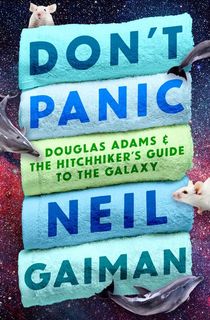March 11th, 2019 would have been the late Douglas Adams' 67th birthday. In his honor, we're excited to announce The Portalist's Douglas Adams Birthday Celebration. Over the next two weeks, we'll be publishing stories that explore Adams' life and legacy. Read Adams' still-relevant thoughts on conservation below.
Shortly before his death in 2001, Douglas Adams gave a talk at the University of California, Santa Barbara. The author and satirist offered anecdotes and life lessons from his time spent abroad tracking down endangered animals. Nearly two decades later, his talk “Parrots, the Universe and Everything” is as fresh and relevant as ever.
RELATED: 16 Harming Neil Gaiman Quotes
Though Adams rose to fame for The Hitchhiker’s Guide to the Galaxy, he revealed in this talk that of all the books he had written, his favorite was actually the lesser-known Last Chance to See. The 1990 book was written after Adams returned from a once-in-a-lifetime trip around the globe. As part of a project to raise awareness for wildlife conservation, the author was invited to accompany zoologist Mark Carwardine on a mission to encounter endangered species around the world and write about his experiences.
Though “Parrots, the Universe and Everything ” has a serious message to convey about the state of our earth and wildlife, much of the discussion is devoted to recounting hilarious anecdotes from his time abroad. At one point, Adams and Carwardine were heading to Komodo, Indonesia, to observe Komodo dragons. The island has the most poisonous snakes per square meter than anywhere else on earth, so they made a pit stop in Australia to consult Dr. Struan Sutherland, an expert on venomous snakes.
When Adams asked what to do if they were bitten by something deadly, Dr. Sutherland replied, “Well, what do you think you do? You die of course. That’s what deadly means.” Upon pressing for further advice, Adams was told: “Well don’t get bitten, that’s all I can say. And don’t come running to me if you do, because you won’t get here in time!”
Adams also spoke about the Kakapo of New Zealand, and had the audience laughing at the animal’s expense. The Kakapo is a flightless parrot with an overly complicated mating ritual: overall, a rather absurd creature. But the discussion took a serious turn when Adams pointed out that prior to human contact, Kakapos didn’t have any natural predators and never evolved to be defensive or to mate efficiently. They are now endangered because sadly, they have not been able to adapt to their new world.
Related: 10 Hilarious Douglas Adams Quotes
Adams draws a powerful connection between humans and the Kakapo. Though we regard the flightless parrot as silly, we too are being destroyed by our inability to adapt to changing circumstances. Developing tools and technology to protect ourselves from the dangers of the environment was once our most advantageous ability. But we’ve shielded ourselves so much that now we’re blind to the disastrous environmental consequences of our actions.
Adams tried to stress that the Information Age is useless if we can’t put that information to good use. He put it best when he said, “There is a kind of terrible irony that at the point that we are best able to understand, and appreciate, and value the richness of life around us, we are destroying it at a higher rate than it has even been destroyed before.”
Related: Don't Panic Explores Douglas Adams' 'Lost Year' in L.A.
Adams concluded the talk by leaving the audience with a thought-provoking point: the world is billions of years old, and has survived all manner of changes. “We don’t have to save the world,” he said, “The world is big enough to look after itself. What we have to be concerned about, is whether or not the world we live in, will be capable of sustaining us in it.”
Want more Douglas Adams? Download his biography, Don't Panic: Douglas Adams & The Hitchhiker's Guide to the Galaxy.
Featured photo: Wikimedia Commons

